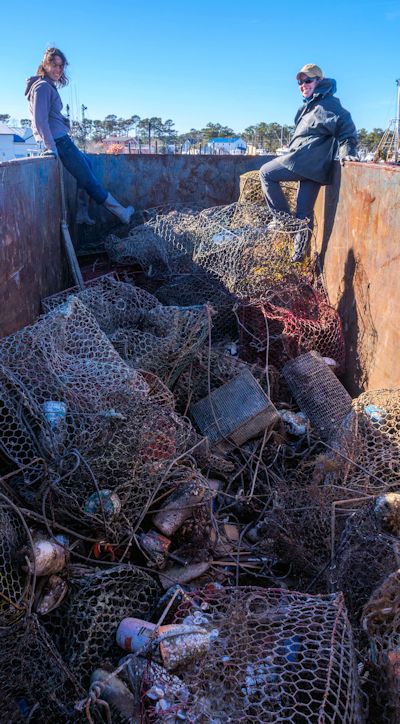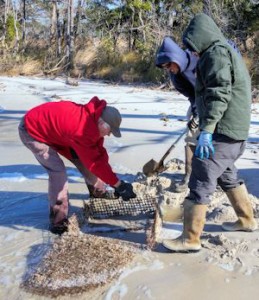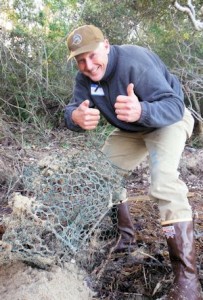Marine Life & Conservation
Crab Pot Project Gets a Thumbs Up

As a busy-body pelican landed nearby to watch, Manteo crabber Troy Outland pulled his 32-foot Manning boat astride a barnacle-covered chunk of white buoy while mate Derek Thacker pulled it from Croatan Sound.
“That one’s been there for a while,” Outland said, eyeing the dripping remnant of a crab pot.
The line was slimy with algae and grass and attached to the rusted remains of the pot’s metal bottom frame. Bingo: A derelict pot. Thacker wound up the line and stashed it at the stern. Outland recorded identifying information, time and location and started his motor to look for more.
So began day one of the N.C. Coastal Federation’s two-year pilot project to collect lost or discarded fishing gear littering waterways in north eastern North Carolina.
Outland, a full-time crabber for 37 years, was one of nine watermen hired to scour the waters for two days last week, coming behind the annual cleanup done by the N.C. Marine Patrol.
“You don’t really make a lot of money, after fuel costs,” he said. “I’m doing it because I think it’s a good project.”
By the time the first phase wrapped up at week’s end, surprisingly little debris was found by the watermen. Still, the effort, the first of its kind in North Carolina, achieved what it was designed to do: Bring watermen, regulators, and conservationists together for the benefit of the resource they all share.
“Overall, we were astounded that we didn’t see more pots,” said Willy Phillips, owner of Full Circle Crab Co. in Columbia. “That was a real revelation to us.”
Phillips, who has been crabbing in North Carolina waters since the 1980s, said that the lack of big storms in recent years is one likely reason that more crab pots were not found after two days scouring parts of the Pamlico, Roanoke, Croatan, Albemarle and Currituck sounds, the Alligator River and Kitty Hawk Bay.
Also, with the increasing cost of crab pots, he said, crabbers have become more diligent about retrieving their gear. When he was crabbing in the 1980s, Phillips said, pots cost about $6.50 each. Now they each cost about $45. And pots are not made to last as long as they once did, so they deteriorate quicker – as soon as two years.
“Back in the day, there was a lot more gear left out,” Phillips said. “It was just that there weren’t as many people out there to keep track of it.”
Willy Phillips
Ladd Bayliss
As long as there are pots put in the water, one way or another, some will end up disappearing, being abandoned, tossed adrift by hurricanes or even stolen.
Plucking lost or orphaned crab pots out of the water is a lot more challenging than it sounds. The remnants of buoys can be indistinguishable from a bird or a whitecap on the water. Gear is often buried or tangled. Phillips explained that in bad weather, the buoys start “corkscrewing” and are eventually pulled under the water. Then over time, he said, the buoys will slowly “unkink” themselves.
Other pots, perhaps taken away by a storm or cut by boat propellers, are often found with their lines twisted around bridge pilings.
“When I started here nine years ago, we picked up roughly 10,000 pots that were out in the sound between Jan. 15 and Jan. 24,” said Sgt. Odell Williams, who works the southern half of the northern district of the N.C. Marine Patrol – half of Hyde and Dare counties. “Every year it has gone down – the last several years significantly.”
This year, he said, the patrol probably picked up less than 300 pots.
By law, crab pots must be out of the water from Jan. 15 through Feb. 7, but the water can be opened after Jan. 19 if few pots are found.
Williams said he attributes the steady decrease in orphaned and derelict gear to better Marine Patrol enforcement and more cooperation from watermen. When officers find a pot, they look for the tag that identifies the owner. If they find it, they will usually call the crabber to come fetch his pots. Otherwise, a court order must be obtained to have them destroyed.
Less often, Williams said, a ticket is issued to the crabber, who would be facing over $200 in fines and court costs. “Storms come in; fishermen lose their pots,” he said. “We try to be respectful to the fishermen. Everybody does not deserve a ticket.”
Williams said that throughout the planning and implementation of the project, the relationship between marine law enforcement, the watermen and the federation has been “excellent.”
“We’ve really enjoyed working with them,” Williams said. “We’ve gotten along great.”
The genesis for the project came from the successful marine debris program launched several years ago in the Chesapeake Bay. By 2012, tens of thousands of derelict crab and peeler pots in Virginia and Maryland waters had been collected.
Although the Chesapeake program was the inspiration for the federation project, it was expected that it would need to be tailored to the different conditions in northeastern N.C. waters, said Ladd Bayliss, the coastal advocate in the federation’s Manteo office.
“I think in certain areas, we’ve got more tide, we’ve got more wind, we’re generally shallower,” she said. “It’s not apples to apples.”
Some boats were equipped with side-scan sonar, the first time the technology was put to work in North Carolina to find pots. Over the course of the project, Bayliss said, it became evident that the same protocol and retrieval methods employed in the Chesapeake were not appropriate in N.C. waters.
Out of the 30 or so crabbers who applied to work on the cleanup, Bayliss said, nine of them were hired to do the collection. Boat captains were paid $300 a day and deck hands $100.
The second year of the pilot project, funded with a $35,000 grant from the National Oceanic and Atmospheric Administration, an $18,000 grant from North Carolina Sea Grant and $10,000 in matching funds, will be conducted in the same time period next year.
In the meantime, the lessons learned from this year will be used to make the collection process more effective and efficient in 2015.
“I feel like this time we were able to get a collaborative group of people together to get the mechanics worked out,” Phillips said. “We were on the same page.”
A marine debris program has been talked about in North Carolina for a long time, he said. But until last year, opposition and suspicion never allowed such a project to get beyond fits and starts.
“What I think is the star achievement of the grant is that the fishermen are actively collecting data,” Phillips said, referring mostly to by-catch found in crab cages.
Fishermen have been gun-shy about providing that data because of the perception that in the past they’ve been burned by increased regulations.
Phillips, a former member of the N.C. Marine Fisheries Commission, said that N.C. watermen have always contended that by-catch is not significant down here compared with Virginia. But without the data, there’s no way to prove it.
A less obvious gain from the project is the positive experience of working cooperatively in a conservation effort that benefits all involved and serves the better good, Phillips said. It also shows that fishermen don’t just take from the public resource, as critics charge, but are willing to give back, he said.
“It’s an image-changer in the public’s eye,” Phillips said. “I really hope it will continue and expand.”
Article courtesy of www.nccoast.org
For more information on Ghost Fishing, visit https://www.facebook.com/ghostfishing
Marine Life & Conservation
Paul Watson Released as Denmark Blocks Japan’s Extradition Bid

Renowned anti-whaling activist Paul Watson has been released from custody in Greenland after spending five months in detention. Denmark’s Justice Ministry rejected Japan’s request for his extradition, citing insufficient guarantees that his time already served in custody would be credited against any potential sentence.
The 74-year-old Canadian-American was arrested on July 21 in Nuuk, Greenland’s capital, when his ship docked to refuel. His arrest was based on a 2012 Japanese warrant related to a 2010 encounter in Antarctic waters. Japan alleged Watson obstructed operations and caused damage to a whaling research ship during efforts to disrupt illegal whaling. Watson has consistently denied these claims, maintaining his commitment to marine conservation.
Denmark, which oversees extradition matters for Greenland, concluded that while the legal conditions for extradition were met, the lack of assurances from Japan regarding time-served credit made extradition untenable.
In a video shared by his foundation, Watson expressed gratitude and relief, saying, “After five months, it’s good to be out… and good to know they’re not sending me to Japan.” He added that the most difficult part of his time in custody was being separated from his two young sons.
Watson is a pioneering figure in marine conservation, known for founding the Captain Paul Watson Foundation in 2022 after decades of activism with the Sea Shepherd Conservation Society. His bold efforts to defend marine life have earned him widespread support, including from celebrities and conservationists. His work has also been featured in the acclaimed reality TV series Whale Wars.
Watson’s lawyer, Jonas Christoffersen, praised the decision, stating, “We are happy and relieved that Paul Watson is now free.” He added that Watson is eager to reunite with his family and continue his vital work.
The arrest occurred while Watson’s vessel, the M/Y John Paul DeJoria, was en route to the North Pacific with a team of 26 volunteers to intercept a Japanese whaling ship. His foundation described the arrest as politically motivated and emphasized that Watson’s actions were focused on ending illegal whaling practices.
Japan resumed commercial whaling in 2019 after leaving the International Whaling Commission, asserting that whale meat is a cultural tradition. Conservationists, however, continue to challenge these practices, highlighting their impact on marine ecosystems.
Despite the challenges, Watson remains steadfast in his mission to protect marine life and bring attention to whaling practices. His dedication to ocean conservation has made him a globally respected advocate for the environment.
Marine Life & Conservation
12 Days of Zero-Waste Fish-mas

This holiday period, the Marine Conservation Society, the UK’s leading ocean membership charity, invites you to make some simple changes to eating fish this Christmas to help our seas.
Dr Kenneth Bodles, Head of Fisheries and Aquaculture at the Marine Conservation Society, said, “During the festive season, our consumption increases, but so does waste. Sustainability isn’t just about where food comes from – it’s also about how you use it. By reducing waste and making the most out of your seafood, you’re not only taking steps to be more ocean-friendly, but can also help to cut costs during what is often one of the most expensive times of the year”.
The Marine Conservation Society has compiled twelve tips on how to consume seafood sustainably with zero-waste this Christmas:
Buy whole fish instead of fillets
Instead of fillets, consider buying whole fish such as salmon, hake, or lemon sole. By adopting a “nose to tail” approach with cooking, whole-baked fish not only feeds a crowd, but also helps to minimise waste and maximise sustainability by using up every part of the animal, including bones, skin, and fat.
Make fish stock
Leftover fish bones or shells can be put to good use by boiling them to make a nourishing fish stock or bisque. This can be frozen and preserved for later use and makes for a flavourful base in a soup.
Make your own fish pâté
Avoid waste by turning leftover fish, such as smoked mackerel or salmon, into a delicious pâté by blending with cream cheese and lemon. Perfect when paired with crackers.
The sustainability of salmon and mackerel varies depending on where and how it is caught or farmed. For more information on green-rated options, check the charity’s Good Fish Guide.
Buy frozen
By purchasing seafood that is frozen or vacuum-packed, this helps to reduce waste by extending the shelf life of your food.
Fish pie
If you’re wondering what to do with leftover cooked fish, why not opt for a classic fish pie with mashed potatoes, leeks, and a cheesy sauce? A sure crowd pleaser on Boxing Day.
Use the head
Don’t forget the fish head! The meat is incredibly tender and flavourful. The charity recommends a cod’s head curry or recreating Fallow’s renowned cod’s head in siracha butter.
By stretching your ingredients further, not only is this a more sustainable way to enjoy seafood, but also cost-effective by repurposing leftovers and cooking creatively.
Boxing Day brunch
Mix leftover kippers or smoked salmon with scrambled eggs for a tasty, zero-waste, Boxing Day brunch.
For best choice, make sure you buy kippers, or herring, from the North Sea and the North Irish Sea.
Zero-waste storage
A top tip from the Marine Conservation Society to avoid waste is freezing fish offcuts to save for future use.
Crisp up the skin
Even leftover fish skin can be turned into a quick savoury snack by crisping it up in an air fryer with a little olive oil and salt.
Anchovies two ways
Leftover anchovies can either be blended with butter to make a delicious anchovy butter or tossed into pasta for a hit of umami flavour.
The charity recommends opting for anchovies caught in the Bay of Biscay for best choice.
Fishcakes
For an easy, zero-waste meal, leftover seafood trimmings can be mixed with mash and fried in breadcrumbs to make fishcakes.
Pickled mussels
Try pickling mussels in 1:1 vinegar and water, with a dash of sugar for a sustainable, zero-waste snack that can be enjoyed well beyond the festive season.
Mussels farmed in the UK are a seafood superhero. Grown using low-impact methods and harvested by hand, they get all the food they need from the sea around them. This makes them one of the most sustainable, ocean-friendly, and cost-effective seafood options.
Players of People’s Postcode Lottery have raised £6.6M towards the Marine Conservation Society’s vital work in making seafood more sustainable.
Laura Chow, Head of Charities at People’s Postcode Lottery, said: “Fish is a festive favourite for many, but making sustainable choices when it comes to how we buy and eat seafood makes all the difference for our ocean. Support from players of People’s Postcode Lottery has helped the Marine Conservation Society further its sustainable seafood work, so that we can all enjoy healthier, better protected seas.”
The Marine Conservation Society encourages you to make sustainable seafood choices a year-round habit, not just for Christmas. To check how sustainable the seafood on your plate is, you can visit the charity’s Good Fish Guide. The Guide helps consumers and businesses identify the most sustainable seafood using a simple traffic light system, based on where and how species are caught or farmed. Green is the best choice, amber means improvements are needed, and red indicates fish to avoid buying.
Zero-waste gift idea
Why not embrace a zero-waste Christmas by gifting a membership to support marine conservation? It’s a meaningful, low-waste gift that helps protect our ocean for generations to come. Memberships start from as little as £5 a month – the price of a sandwich and drink from your local coffee shop.
Find the latest sustainable seafood advice for wild-caught and farmed seafood on the Good Fish Guide, downloadable to your phone from www.mcsuk.org/goodfishguide.
-

 News2 months ago
News2 months agoIconic SS United States to become the World’s Largest Artificial Reef
-

 News3 months ago
News3 months agoBook Review – 52 Assignments: Underwater Photography
-

 Gear News3 months ago
Gear News3 months agoDYNAMICNORD – New German diving brand enters the British market
-

 News3 months ago
News3 months agoExploring Cenote El Pit: A Diver’s Dream
-

 Gear News3 months ago
Gear News3 months agoTry BARE drysuits (and maybe even win one!) this Friday with Sea & Sea at North West Dive Fest
-

 Marine Life & Conservation3 months ago
Marine Life & Conservation3 months agoBook Review: Coral Triangle Cameos
-

 Blogs2 months ago
Blogs2 months agoDive the Egyptian Red Sea this Autumn with Regaldive
-

 News3 months ago
News3 months ago2024 Ocean Art Underwater Photo Competition Announced







